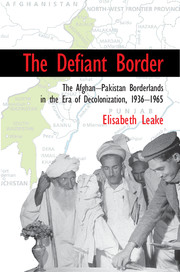Book contents
- Frontmatter
- Contents
- Preface and Acknowledgments
- List of Abbreviations
- Maps
- Introduction: “A Doughty and Honourable Opponent”: Historicizing the Afghan– Pakistan Borderlands
- 1 “Using a Crowbar to Swat Wasps”: The Frontier Tribal Area in Imperial Defense
- 2 The “Opening of Sluice- Gates”: Plan Partition and the Frontier
- 3 “We Are One People and Ours Is a Land”: The Demand for Pashtunistan, 1948–1952
- 4 A “Friendly Point of Return”: Pakistan and the Global Cold War
- 5 An “Eye for an Eye”: Mohammad Ayub Khan and the Collapse of Regional Relations
- Conclusion: “Religion, Land, Lineage and Honour”: The Afghan–Pakistan Borderlands Then and Now
- Index
Introduction: “A Doughty and Honourable Opponent”: Historicizing the Afghan– Pakistan Borderlands
Published online by Cambridge University Press: 20 January 2017
- Frontmatter
- Contents
- Preface and Acknowledgments
- List of Abbreviations
- Maps
- Introduction: “A Doughty and Honourable Opponent”: Historicizing the Afghan– Pakistan Borderlands
- 1 “Using a Crowbar to Swat Wasps”: The Frontier Tribal Area in Imperial Defense
- 2 The “Opening of Sluice- Gates”: Plan Partition and the Frontier
- 3 “We Are One People and Ours Is a Land”: The Demand for Pashtunistan, 1948–1952
- 4 A “Friendly Point of Return”: Pakistan and the Global Cold War
- 5 An “Eye for an Eye”: Mohammad Ayub Khan and the Collapse of Regional Relations
- Conclusion: “Religion, Land, Lineage and Honour”: The Afghan–Pakistan Borderlands Then and Now
- Index
Summary
On April 20, 1960, The Times of London ran an article on the death of the Faqir of Ipi. The article described this political and religious leader from Pakistan's frontier tribal area as “a doughty and honourable opponent,” grudgingly admiring how “He defied for years all the efforts of political agents and military columns to induce his surrender or neutralise his activities” against the British Empire. The Faqir had long been influential in frontier politics, and the key events of the mid-twentieth century there had punctuated his career. He had led a major tribal revolt against the colonial state in 1936–7; appealed to the Axis powers during the Second World War for financial and military support in renewing his resistance against the British; and had emerged as an ardent supporter of an autonomous “Pashtunistan” in the wake of decolonization and the emergence of independent India and Pakistan. Thereafter, he had actively sought Afghan aid and interference on both sides of the Durand Line, which separated Afghanistan and Pakistan, in the name of the Pashtun people. Why did The Times, thirteen years after Indian and Pakistani independence, pay homage to a man best known as an intractable opponent of the British Empire and its successor state, Pakistan? Part of the answer lies in the enduring appeal of the Afghan–Pakistan borderlands, where fierce clashes between imperial forces and Pashtun tribes, who themselves were governed by tribal codes based on revenge, honor, and hospitality, sparked the imagination of generations of British, Pakistani, and U.S. military and civil officials. One need only look at the works of Rudyard Kipling, Winston Churchill, and John Masters, among others, to see the frontier's inspiration.
Part of the frontier's appeal was its (apparent) remoteness. This only became increasingly evident as time passed. The era of decolonization and the Cold War saw the globe's peripheries emerge into prominence. Independence from empire solidified fuzzy colonial frontiers into firm, internationally recognized borders; empire's diverse subjects increasingly had to acquiesce to nationhood and its citizenship requirements. But this was not a smooth process. The problem of delineating borders, integrating ethnic and religious minorities, and dealing with a new global order that was frequently dominated by the United States–USSR rivalry complicated postcolonial nation building.
- Type
- Chapter
- Information
- The Defiant BorderThe Afghan-Pakistan Borderlands in the Era of Decolonization, 1936–65, pp. 1 - 19Publisher: Cambridge University PressPrint publication year: 2016



